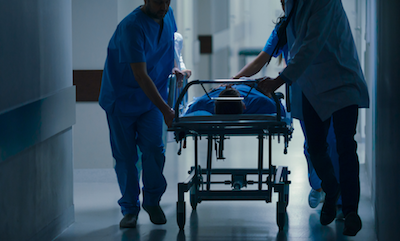Gunshot Survivors Likely to Return to Hospital.
 The national conversation about gun violence tends to focus on deaths. But the CDC estimates that 1.5 million Americans survived gun violence injuries between 2000 and 2017.
The national conversation about gun violence tends to focus on deaths. But the CDC estimates that 1.5 million Americans survived gun violence injuries between 2000 and 2017.
Now, a new study led by School of Public Health researchers finds that gunshot survivors are more likely than other kinds of injury survivors to have lasting health issues.
The study, published in the Journal of Interpersonal Violence, found that 1 in 10 gunshot survivors returned to the hospital within three months of being discharged, making them more likely to do so than people who had been hit by cars or were in car accidents.
“Life does not go back to normal after surviving a gunshot injury,” says study lead author Bindu Kalesan, assistant professor of community health sciences. “For the rest of their lives, survivors will suffer health consequences that will be expensive and will have a great impact on their daily living.”
Kalesan and her colleagues used national hospital readmission data from 2013 and 2014. They identified 3,334 hospitalizations of people who had been shot, 3,818 people who had been hit by cars as pedestrians, and 24,672 people who had been in a car in a car accident. They then identified how many people in each category were hospitalized again within 90 days.
They found that 10 percent of gunshot survivors returned to the hospital. After adjusting for the severity of the patients’ injuries, the researchers calculated that gunshot survivors were 20 percent more likely to return for further treatment than the pedestrians who had been hit by cars, and 30 percent more likely than car occupants who had been in car accidents.
Kalesan notes that the majority of gunshot survivors are on Medicaid, and a large proportion are uninsured. In addition to further research on the lifelong health risks associated with surviving a gunshot injury, she says, there should be more research on the costs of these long-term consequences. “We also need to have better healthcare options and insurance for survivors,” she says. “Will Medicaid alone be enough to cover their additional treatment expenses? What happens to those who do not have health insurance?”
The study was co-authored by Vasan Ramachandran, professor of epidemiology; Sandro Galea, dean and Robert A. Knox Professor; and Yi Zuo of the School of Medicine.